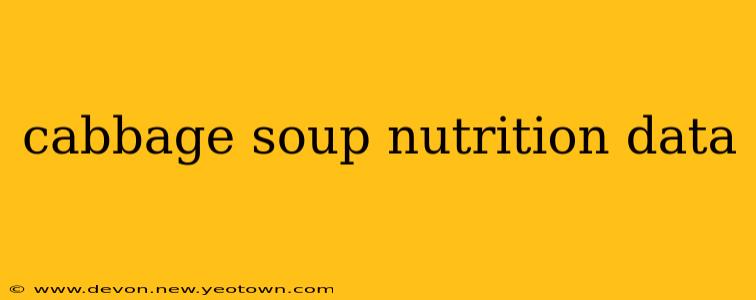Cabbage soup, a staple in many cultures and often touted for its weight-loss properties, is far more than just a simple broth. Its nutritional profile is surprisingly rich, offering a blend of vitamins, minerals, and fiber that can contribute to overall health. But before we dive into the specifics, let's remember that while cabbage soup can be a healthy part of a balanced diet, it's not a magic bullet for weight loss or a complete nutritional solution.
What are the Nutritional Benefits of Cabbage Soup?
The nutritional content of cabbage soup varies greatly depending on the ingredients. A basic version, featuring cabbage, carrots, celery, and broth, provides a good source of several essential nutrients. Imagine this: a fragrant pot bubbling away, filled with vibrant vegetables, each contributing its own unique nutritional punch. The humble cabbage, the star of the show, is packed with vitamin C, a powerful antioxidant, bolstering your immune system. Carrots add a dose of beta-carotene, which your body converts to vitamin A, crucial for healthy vision and skin. Celery contributes fiber, aiding digestion and promoting satiety, keeping you feeling fuller for longer. The broth itself, whether vegetable or chicken, provides electrolytes and further contributes to hydration.
What Vitamins and Minerals are in Cabbage Soup?
This is where the deliciousness truly meets the healthful. A typical serving of cabbage soup (around one cup) can offer a significant amount of vitamin C, vitamin K, and folate. These are all vital for various bodily functions, from blood clotting (vitamin K) to cell growth and development (folate). The mineral content is equally impressive, with potassium contributing to healthy blood pressure and manganese playing a role in bone health and metabolism. The exact quantities will depend on the recipe and ingredients used. For example, adding beans boosts protein and fiber content considerably.
How Many Calories are in a Bowl of Cabbage Soup?
The calorie count of cabbage soup varies greatly depending on the recipe. A simple, low-calorie version might contain as few as 100-150 calories per serving. However, adding meats, beans, or creamy additions can significantly increase the calorie count. Think of it like this: a light vegetable broth-based soup is vastly different from a hearty, sausage-laden version. Paying close attention to your ingredients is key to controlling the calorie intake.
Is Cabbage Soup Good for Weight Loss?
This is a frequently asked question, and the answer is nuanced. While cabbage soup is low in calories and high in fiber, making it potentially helpful for weight management as part of a broader dietary approach, it's not a stand-alone weight-loss solution. Sustained weight loss requires a holistic approach encompassing balanced nutrition, regular exercise, and mindful eating habits. Relying solely on cabbage soup for weight loss can lead to nutritional deficiencies and is not sustainable in the long term.
What are the Potential Downsides of Eating Only Cabbage Soup?
Restricting your diet to only cabbage soup can be detrimental to your health. It lacks essential nutrients like iron, calcium, and omega-3 fatty acids, which are vital for optimal health. This type of restrictive diet can also lead to nutrient deficiencies, fatigue, and muscle loss. It's crucial to remember that a varied diet, rich in fruits, vegetables, whole grains, and lean proteins, is essential for long-term health and wellbeing.
Is Cabbage Soup a Good Source of Protein?
On its own, cabbage soup is not a significant source of protein. The protein content primarily comes from any added meats, beans, or lentils. Therefore, to ensure sufficient protein intake, it's important to include other protein-rich foods in your overall diet. Think of adding lean chicken or beans for a more protein-packed meal.
In conclusion, cabbage soup can be a healthy and nutritious addition to a balanced diet. Its rich vitamin and mineral content and high fiber content contribute to overall well-being. However, it’s crucial to remember that it's not a miracle food or a sole solution for weight loss. A varied and balanced diet, combined with a healthy lifestyle, remains the key to optimal health.

